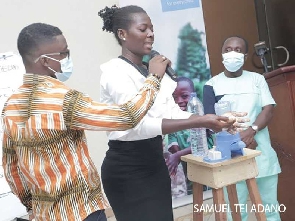Ghanaian journalists and media practitioners have been urged to use their platforms to advocate and sensitize the public on the need to practice effective hand hygiene.
At a forum held jointly by UNICEF Ghana and the Ministry of Sanitation and Water Resources on November 10, 2022, in Accra, journalists drawn from reputable media houses in the country were enlightened on proper hand hygiene practices.
They were also encouraged to use their respective platforms to dispel myths about hand hygiene and design programs and stories that will make Ghanaians realize the enormous health benefits of adopting effective hand hygiene practices.
Addressing the media practitioners, Suzzy Abaidoo an official of the Ministry of Sanitation and Water Resources emphasized the need for all stakeholders to join forces and create awareness about hand hygiene and handwashing.
She explained that the media is strategically positioned to serve as an instrument of behavioral change, hence the need for the media to continue to drum home the importance of hand hygiene.
The National Consultant of Hand Hygiene For All (HH4A), Charles Nachinab raised concern over the lack of adequate handwashing provisions at various facilities in the country.
He noted worryingly the gap between the populace and the availability of handwashing facilities continues to widen and that drastic measures ought to be put in place to address the situation.
He disclosed that a staggering 58% of Ghana's over 30 million population do not have access to handwashing facilities.
About HH4A
HH4A is an initiative by the World Health Organisation (WHO) and UNICEF that came on the heels of the onset of COVID-19. It is a call for all of society to achieve universal access to hand hygiene through a three-R approach namely respond to COVID-19, rebuild after the COVID-19 pandemic, and reimage hand hygiene to become part of the people’s culture.
The initiative aligns with the Sustainable Development Goal (SDG) 6.2 and it identifies 12 settings where handwashing facilities are expected to be available.
They are households or homes; schools; childcare homes; healthcare facilities; workplaces; markets; transport terminals; correctional centers; worship centers; refugee camps; eateries and events or recreational centers.
Health News of Wednesday, 16 November 2022
Source: www.ghanaweb.com













